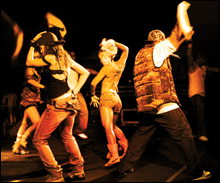That beat you’ve been hearing — the steady boom-ch-boom-chick rattling the trunks of passing cars and moving masses in the club — isn’t just another fleeting hip-hop trend. It’s the new sound of the Americas. Make way for reggaeton, the latest Latin musical style to sweep the world and just maybe the one with the most promise of finding a permanent, prominent place not just in the US, but in global popular culture.
 Reggaeton has already accomplished something that other Latin musical forms — son, mambo, salsa, merengue, bachacta — never quite attained: not only has the music ignited the imaginations of young Latinos and Latinas, but it’s found unprecedented favor in mainstream US culture. Just a few years ago the Spanish one heard on non-Latin, commercial radio was limited to “Feliz Navidad” and “La Vida Loca”; now one hears 15 to 30 minute blocks of Spanish-language pop on the same stations that promise nothing but “blazin’ hip-hop and R&B.”
Reggaeton has already accomplished something that other Latin musical forms — son, mambo, salsa, merengue, bachacta — never quite attained: not only has the music ignited the imaginations of young Latinos and Latinas, but it’s found unprecedented favor in mainstream US culture. Just a few years ago the Spanish one heard on non-Latin, commercial radio was limited to “Feliz Navidad” and “La Vida Loca”; now one hears 15 to 30 minute blocks of Spanish-language pop on the same stations that promise nothing but “blazin’ hip-hop and R&B.”

Indeed, reggaeton’s inroads into hip-hop’s media channels may prove crucial in the genre’s ability to transcend, all hype aside, the “craze” status that has marked previous spikes of interest in Latin music. In contrast to the exotic cast that has consistently marked Latin music packaged for non-Latin audiences, reggaeton enjoys a sonic profile that, for all its syncopation and sway, is heard as something more familiar, more modern, more American (in the US-centric sense). Reggaeton artists and producers have not simply piggybacked on the success of their hip-hop brethren, they have exploited and expanded hip-hop’s hustle-hustle business model, especially in such areas as shameless self-promotion, savvy cross-branding, street-team marketing, and grassroots distribution.
Reggaeton lacks much of an exotic veneer precisely because the music has not been marketed to Anglo-American audiences. At least until recently, reggaeton has been music produced by and for the pan-Latino community. On the main, it still is, though many artists and producers now aspire to the platinum plaques that million-sellers such as Daddy Yankee and Luny Tunes have proven are within reach. Reggaeton’s self-sustaining relationship to a sizeable core audience draws our attention to the most obvious underlying reason for the genre’s seemingly sudden ubiquity: simple demographics.
You’ve heard it before: one in eight people in the US speaks Spanish, with much higher rates in cities, while “Hispanics” — although something of a constructed category, perhaps more useful to politicians, and far from monolithic — have surpassed African-Americans as the nation’s largest ethnic group, with census-based projections predicting 20% of the country’s population will be of Hispanic-origin by 2020. Latino migration is also increasingly circular, especially for Puerto Ricans who, as US citizens, can travel within the States relatively unfettered. One effect of these seismic socio-cultural shifts is that a number of US cities, especially along the coasts, have become veritable centers of the pan-Latino community, and the soundscapes of New York, Miami, Boston, and other sites of migration reflect this growing presence with their cosmopolitan musical hybrids, of which reggaeton represents the latest and greatest.